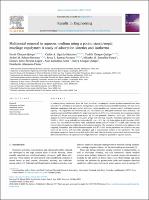Multimetal removal in aqueous medium using a potato starch/nopal mucilage copolymer: A study of adsorption kinetics and isotherms
Date
2023Author(s)
Choque Quispe, David
Ligarda Samanez, Carlos Alberto
Choque Quispe, Yudith
Solano Reynoso, Aydeé M.
Ramos Pacheco, Betsy S.
Zamalloa Puma, Miluzka M.
Álvarez López, Genaro Julio
Zamalloa Puma, Alan
Choque Quispe, Katya
Alzamora Flores, Humberto
Metadata
Show full item recordAbstract
In reducing heavy metals from water for direct or indirect consumption, various synthetic materials have been
used; there is a tendency to use natural, biodegradable, and environmentally friendly materials. The aim was to
elaborate copolymers with native potato starch and cactus mucilage and evaluate water’s multimetal removal
capacity. The copolymer was characterized, and the kinetics and adsorption isotherms were evaluated. The
copolymers presented high solubility for nopal mucilage levels of 5% w/w, with particle size in aqueous solution
less than 422.83 nm, zero charge point around pH 5.5, and potential between 16.72 and 29.80 mV; FTIR
analysis showed the predominance of anionic groups with chelating capacity. Multimetal adsorption was from
102.20 to 151.43 mg/g, with affinity in the order Pb > As > Al > Hg > Cr, being higher at pH 6 (p-value<0.05).
Kinetic data were fitted to the PSFO, PSSO, and Elovich models with R2>0.994, X2<16.098, ARE<34.038, and
random residual dispersion, indicating a chemisorption process. The adsorption isotherms were adjusted to the
Langmuir, Freundlich, and Redlich-Peterson models with R2>0.863, whose parameters are related to the ionic
radius of the metals, with favorable adsorption and a heterogeneous surface of the copolymer. The mean
adsorption energy was found between 0.05 and 0.23 kJ/mol. The use of native potato starch and cactus mucilage
allows the formulation of copolymers with high multimetal adsorption potential in aqueous systems.
Collections
The following license files are associated with this item:

